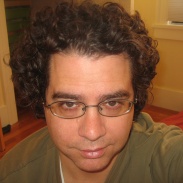What do Wilco, bowling, parenthood and Scottish fiddling have in common? They are all part of what makes Chris O’Brien more than just a great storyteller.

PPR: You are a business columnist at the San Jose Mercury News; what do you look for in a good story
CO: My ideal column finds a view point or a theme that connects to events in the news, but says something broader about Silicon Valley.
As such, I strive to find topics that are broad and of the widest possible interest. If I’m writing about a somewhat narrow technical topic, there’s a big burden on me to convince the average reader that this is really relevant to their lives.
PPR: What is the most challenging story you have written and why?
CO: About 10 years ago, I wrote a long narrative about a woman in Raleigh, N.C. who was graduating from Duke University. Her journey to that point was amazing. She had once been committed to a mental institution where she tried to kill herself. And then spent many years living on the streets homeless. She managed to turn her life around, in part through the help of some friends, and reach the point where she was graduating from a prestigious university and had been accepted to medical school. Researching her story took over a year, and it was a deeply personal and painful tale that required a lot of sensitivity and patience to do right.
PPR: If you had to spend the next 24 hours on a bus with someone, who would you want it to be and why?
CO: Jeff Tweedy, the lead singer of Wilco. I’m hopelessly obsessed with Wilco.
PPR: What is the best pitch you have ever received? What percentage of pitches from PR executives do you think are on target?
CO: It’s hard to single out one pitch and say it was the best. I most appreciate folks who have taken the time to understand who I am and what I do before pitching. To the second part of the question, I’m continually surprised at how many phone calls and e-mails come from folks who truly understand my role here. I’m not saying someone should spend hours of researching me personally. But it’s not hard to peak at our Web site, read a column or two, and get the general sense of my job here. When I get an e-mail from someone mentioning a recent column, I’m more likely to read the e-mail out of respect for the fact that they took the time to get some background before they approached me.
PPR: What do you most like about Twitter?
CO: Twitter remains one of the most useful, innovative means of communications I’ve experienced. At the same time, it remains one of the hardest to explain to other people. For me, Twitter feels like a conversation that I dip in and out of all day. It lets me sit at my desk and feel like I’m in a roomful of (mostly) interesting people. It is so adaptable, that I think it has been able to become many different things to different people.
PPR: If you were not a journalist, what else would you do? Do you have a dream job?
CO: I actually have wanted to be a journalist since I was five years old. So I am one of those people who is actually working in their dream job. That said, the state of our industry has led me to spend more time thinking about the first part of the question lately. I don’t yet have a “plan B” career in mind. I’ve been trying to distill the essence of what I like about being a journalist. I think that’s telling stories, the sense of discovery from identifying a trend that no one else has seen yet, and the thrill of piecing together a complex story. Most important, though, is that feeling that what I do still has an impact on my community in a very direct way, even in this era when newspapers have been somewhat diminished. Now the trick would be to figure out something that still fills all, or most, of those components in a way that leaves me feeling fulfilled.
PPR: What are some of your personal hobbies?
CO: Scottish fiddling, hiking, biking, traveling. Also, I am an outstanding bowler.
PPR: What is your favorite part about being a dad?
CO: It is hard to talk about parenting without being cliché. But I’d say that having children is the most profound experience of my life. Every moment with the kids (ages 6 and 3) requires me to make my priorities in life clear, and puts other successes and failures in context. They have taught me more about myself, I think, than anyone else. I hope I’m a better person because of those lessons.
PPR: What changes are you hoping to see in business in 2009?
CO: I’d like to see businesses become more focused on the long term, and building value for their employees and communities rather than solely focusing on shareholders.
 Recently, one of our staff members, Fred Han, received an interesting email from an industry friend – David Spark of Spark Media Solutions. David is a new media consultant and producer with more than 14 years knowledge and experience as a journalist reporting on the tech industry in print, radio, TV, and online.
Recently, one of our staff members, Fred Han, received an interesting email from an industry friend – David Spark of Spark Media Solutions. David is a new media consultant and producer with more than 14 years knowledge and experience as a journalist reporting on the tech industry in print, radio, TV, and online.
